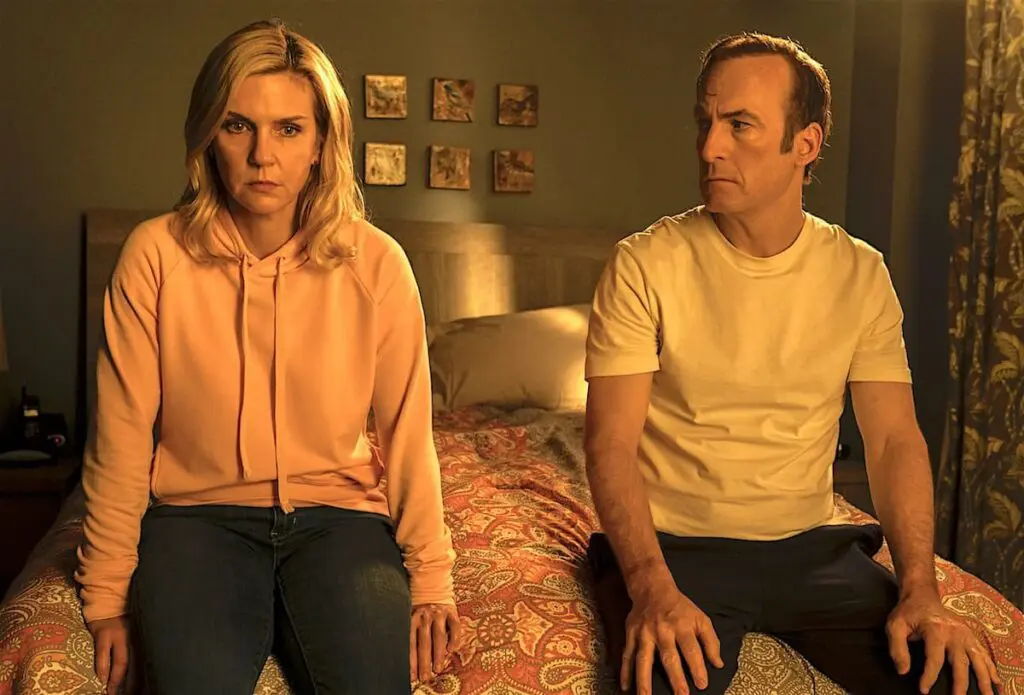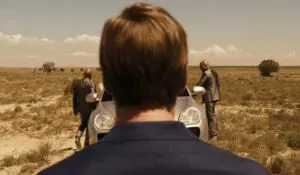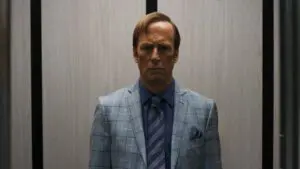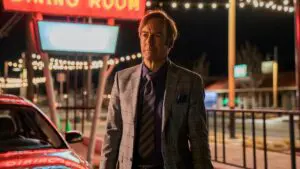Summary
Do not be sad because it’s over, be happy that it happened.
Honestly, how do you sum up this finale in a few words? They did it. They fucking did it. Quite easily one of the best finales in television of all time, and ironically, better than the Breaking Bad ending. And it’s not just one of the best TV series to grace our screens, but Better Call Saul is a golden example of the best character development. This is television at its finest. Do not be sad because it’s over; be happy that it happened.
Better Call Saul Season 6, Episode 13 begins in the desert. Jimmy is walking through it, dehydrated — he finds water and desperately puts his head in it; we’ve been here before. Mike tells him to slow down. Jimmy raises the idea of splitting the cartel money with Mike and building a time machine so they can disappear.
He’s joking, of course, but he’s trying to have a lighthearted talk with Mike to understand him more.
Mike says he’d time travel to 1984 when he first took a bribe; he states he’d take the bribe, and move on, then check on a few people in his life that he loves. Jimmy says he’d travel to 1965, put shares into one of Warren Buffet’s ventures, and then travel back to the present to be a billionaire. Mike is surprised he’d only change his financial outcome.
But this moment is so the audience can be disappointed in him. We are so used to the lighthearted version of this character. It’s time for Jimmy to stop avoiding.
And then we return to where we were left after episode 12. In Gene’s timeline, Jimmy (as Gene) is fleeing from Marion’s house after Marion has discovered his identity.
Gene is now on the run as the police begin their hunt for the infamous Saul. He needs to hide, so he gets inside a dumpster. He tries to call the man who can arrange a new identity for him, but he drops the phone. The police bang on the dumpster. He’s caught.
The capture of Saul Goodman is underwhelming, but maybe that was the point. Continuously living a miserable life was never the answer.
In the police cell, Saul is annoyed at himself for getting caught. After punching the wall, he laughs to himself manically before demanding he has another phone call. Saul rings the lawyer William Oakley and asks him to be his advisory counsel — he calls it an opportunity for him, a “career-maker.” William tells Saul that he is screwed. Saul assures him that he will end up on top.
Saul has his first meeting with the DEA and other involved authorities — they have enough evidence to put him into prison for life without parole. They provide him an offer for 30 years, as long as he stays clean. Saul is distracted and asks for Hank Schrader’s wife to be brought in, Marie so that she can talk. Marie walks into the room and tells Saul how great of a man Hank was. She accuses Saul of being one of the people at fault for his murder and states he “did it all for money.”
Saul sympathizes with Marie and tells her he met her husband a few times and that he was a good man — he tells her that she and her husband are victims. But then, Saul says he’s a victim as well and explains that a few years ago, he was kidnapped by Walter White and Jessie Pinkman. He claims he was afraid, so he worked for Walter. Saul claims he did not run from the police but that he ran away from the people associated with Walter White. He tells Marie that he has nothing.
Saul tells the prosecutor that he only needs one juror to believe his story — he then cites the prosecutor’s record of never losing. He wants some wiggle room, but Marie tells him he cannot negotiate with Saul. Of course, the authorities do not listen to Marie. They are buying into Saul’s last-ever con.
Saul is given seven and a half years in prison, but he also wants to choose the institution he is imprisoned, including the Wing he will reside in. He has the authorities by the balls, but then Saul wants to tell them about the story of Howard Hamlin as another “sweetener,” but they smirk at him — they already know about Howard because of Kim — he has no more sweeteners. Saul is confused, but he has to accept the deal.
With all of Saul’s mind games and plotting, he never considered that Kim would be his last challenge. But the writers have cruelly made that the beauty of the finale.
The final ever episode returns to the Breaking Bad timeline. Saul is with Walter. He asks Walter the same question he asked Mike — what would you do if you had a time machine? Walter calls time travel a scientific impossibility and gets animated. Walter tells Saul he is asking about “regrets,” not time travel — Walter tells him his regret was when he was a graduate student; he created a company with a friend and stepped away thinking it was a gentlemanly thing to do, but he didn’t realize he was being maneuvered outside of his creation. He wished he had stayed.
Walter asks Saul what regrets he has; Saul states that when he was 22, he had a “slip and fall,” and his knee hasn’t been the same since.
But again, while these scenes are cute, it’s a representation that Saul cannot come to terms with what he has done. The finale shows it’s time for Saul to grow up.
In the present day, Saul asks William about Kim’s confession while being escorted on a plane. William reckons the DA will sit on it permanently, but Howard’s wife will be suing Kim perpetually for the rest of her life. Saul tells William that they must tell the government that he has more to trade regarding Howard.
We then flit to Kim; after a routine talk with her colleagues at work, she heads to a volunteering legal services firm. Kim asks if she can volunteer, so they hand her a firm. Kim gets stuck in right away. This is the life she always wanted. Protecting wronged people’s legal rights.
While at the legal firm, Kim receives a call; she’s made aware that Saul Goodman has been arrested and will be giving testimony that affects her.
As we enter the final act, the finale flits to Saul attending court in a snazzy suit. Kim sits at the back, and their eyes meet each other after years apart. Marie is there. There are plenty of emotions in the room. Saul says, “it’s showtime.” It’s United States vs. Saul Goodman. The judge confirms to Saul that he wants to represent himself.
The judge has questions for the prosecution about the sentencing recommendations — she’s confused about the “number of charges but “the lack of years” in prison. Saul stands up to explain the low sentencing — he starts with the same story that he told the prosecutors; that he’s a victim of crime lords, but then he changes his story drastically; he explains that he took the opportunity for big money and helped build Walter White’s drug empire. The judge tries to stop him, but Saul wants to continue, which irritates his lawyer William Oakley. Saul is put under oath so he can continue his story.
It looks like Saul has conned the audience too.
Before Saul continues, he tells the court that he lied about Kim Wexler’s involvement in Howard’s murder and that he just wanted her to be here. Saul confesses to everything and states that Walter White would have been dead within a month if it wasn’t for him, and many others would still be alive. Saul’s lawyer tries to plea “speculation,” but it fails. Saul knows exactly what he’s doing.
Saul continues; he describes what happened to Howard Hamlin — he explains how Kim had the guts to “start over” while he ran away. He then brings in his brother Charles McGill, and calls him an incredible lawyer. He admits he could have tried harder, but he took away everything he lived for, which led to his brother’s suicide. Saul admits he has to live with that.
In essence, Saul is listing his regrets. This is the life he could have avoided. His brother was right along; the path he chose was not the right one. And that was the premise of the earlier seasons of Better Call Saul. His brother saw the transformation of Jimmy into Saul before anyone else did.
Saul then tells the judge that he’s called “James McGill.” At this moment, Saul has returned to Jimmy. He turns around and looks at Kim intently. He’s done the right thing. He’s faced his demons. He’s paying for his sins. They give each other the slightest of smiles.
And we must pause here to recognize this moment. Jimmy was married to Kim, not Saul. Kim divorced Saul, not Jimmy. Something has triggered inside of Jimmy since his arrest; he’s decided to do right by his honorary wife.
We are then treated to another flashback; Jimmy is with his brother Charles, and he’s helping him out. Charles is curious as to why Jimmy is helping him so much — he also wants to connect with Jimmy over his clients. Jimmy doesn’t want to connect. Charles tells Jimmy that there’s no shame in changing his path. Charles knew that Jimmy could be a better person and that he can do the right thing.
We then return to Jimmy, in the present, getting escorted to federal prison on the bus. He sees that the prisoner in front of him is sweating. The man turns around and recognizes him as “Better Call Saul.” Other prisoners recognize him, and they chant “Better Call Saul.” As they chant, Jimmy looks outside, almost half ashamed but half smiling.
In prison, Jimmy is baking again, just like he did as Gene, working in the mall at Cinnabon. He’s alerted that a lawyer is here for him. To his surprise, it is Kim. Once left alone, Kim says, “hi, Jimmy.” This alone sends goosebumps; she knows the man she loves is back to who he is. Kim offers him a cigarette, and she helps him light it, and they smoke it against the wall together. Just like old times. Nothing really changes.
Kim references how Jimmy had his sentence down to seven years, and now it is eighty-six years. Jimmy says with “good behavior, who knows,” which makes Kim laugh again. These two were made for each other. Kim leaves the prison and sees Saul standing in the basketball yard. They look at each other intently again. Kim looks back as she walks off. In the end, Jimmy chose love; he’s hurt enough people in his life.
Read More:




